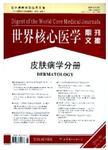急性角膜排斥患者的房水蛋白组学分析
Proteomic analysis of aqueous humour from patients with acute corneal rejection作者机构:Department of Ophthalmology úrhus University Hospital Nφrebrogade 44 8000 úrhus C Denmark
出 版 物:《世界核心医学期刊文摘(眼科学分册)》 (Digest of the World Core Medical Journals:Ophthalmology)
年 卷 期:2005年第1卷第8期
页 面:10-10页
学科分类:1002[医学-临床医学] 100212[医学-眼科学] 10[医学]
主 题:蛋白组学 蛋白印迹 细胞角蛋白 排斥反应 白内障眼 抗胰蛋白酶 丝氨酸蛋白酶 总蛋白含量 质谱测定法 载脂蛋白
摘 要:Purpose: To compare the basic proteomic composition of aqueous humour (AH) fro m patients with corneal rejection (patients) with AH from patients with cataract (controls). Methods: Aqueous humour was analysed for total protein concentratio n using Bradford’s method and for protein composition using two-dimensional (2 D) gel electrophoresis. Image analysis was used to detect protein spots in 2D ge ls that were increased by more than factor 2 in patients as compared with contro ls. Increased spots were identified by immunoblotting and mass spectrometry. Res ults: Aqueous humour from patients contained significantly higher total protein concentration than did AH from controls. A total of 31 spots were significantly increased in 2D gels from patients. The spots were derived from albumin, α1-an titrypsin, apolipoprotein J, cytokeratin type II, serin proteinase inhibitor and transthyretin. After correction of spot volumes by total protein concentrations , 10 spots derived from albumin, cytokeratin type II and α1-antitrypsin remain ed significantly increased. Conclusion: The proteomic composition of AH differed significantly between patients and controls. The identified proteins suggest th at the changes in AH are due to at least three different mechanisms: breakdown o f the aqueousblood barrier, enzymatic degradation, and liberation of locally syn thesized proteins.



